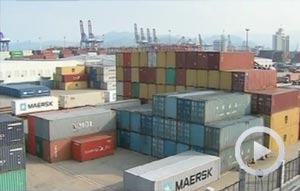Massive debt plagues local gov't
Updated: 2013-07-01 03:11
By WEI TIAN (China Daily)
|
||||||||
Additionally, local authorities have also been relying on "irregular financing channels" to raise money, such as wealth management products issued by local commercial banks, as well as delaying payments on construction projects, the audit office's report said.
"This development also poses a risk because a portion of these transactions is not recorded as debt obligation on balance sheets and, therefore, adds a further layer of complexity in determining local government debt levels," Roane said.
"Some of these products bear interest rates as high as 17.5 percent. The People's Bank of China has a 5.6 percent benchmark loan rate. This adds to the debt burden and creates budget pressure for some entities."
As for the surveyed local governments, bank loans remain the largest source of financing for local governments, accounting for 78 percent of the total balance by the end of 2012, but their share has decreased by 5.6 percentage points since 2010.
In comparison, debt issuance and other borrowings have rocketed by 62 percent and 125 percent respectively during the same period. "Such figures are also representative of other local governments across the country," Zhao said.
He said bank loans and bond issuance together account for approximately 90 percent of the debt on local government balance sheets, while the other 10 percent consists of private equity funds and default on construction payments.
According to a calculation by The Economic Observer, local governments will face two trillion yuan in debts due this year. That accounts for nearly 20 percent of their fiscal revenue and more than half of the fees from land sales.
"Such a large amount of payments would definitely hinder local governments' investment ability and, therefore, add pressure on local economic growth," said Wang Yongjun, director of the Institute for Finance and Economics Research at Central University of Finance and Economics.
To deal with the problem, experts are calling for an increase in local government revenues by up to 2 trillion yuan a year by means of a series of reforms in taxation and income division between local and central government.
"The challenge of the local government debt issue will definitely push forward further reform in the fiscal system but such reform is not restricted to simply seeking more revenue for local governments," Zhao said.
He added that 85 percent of the fiscal revenue in 2012 ended up in the pockets of local authorities so there will not be much room for improvement.
"The main problem is the inconsistency of liabilities in the investment, approval and construction of local government projects," Zhao said,
He also suggested the financing source of a public project must be approved before it gets to the construction stage.

 Joey Chestnut wins 7th contest with 69 dogs
Joey Chestnut wins 7th contest with 69 dogs
 Lisicki, Bartoli to vie for new Wimbledon crown
Lisicki, Bartoli to vie for new Wimbledon crown
 Muscle Beach Independence Day
Muscle Beach Independence Day
 Tough workout for Li Na in war of words
Tough workout for Li Na in war of words
 Submersible taps mineral deposits in S China Sea
Submersible taps mineral deposits in S China Sea
 Ecuador finds spy mic for Assange meeting
Ecuador finds spy mic for Assange meeting
 US martial artists arrive at Shaolin Temple
US martial artists arrive at Shaolin Temple
 July 4 in Prescott: Balance of grief, patriotism
July 4 in Prescott: Balance of grief, patriotism
Most Viewed
Editor's Picks

|

|

|

|

|

|
Today's Top News
Baby formula price probe to shake or reshape industry?
Passenger detained over bomb hoax in NE China
High rent to bite foreign firms in China
Egypt's prosecution imposes travel ban on Morsi
Russia more impatient over Snowden's stay
Mandela still 'critical but stable'
Figures show shifts in US, China economies
Chinese electrician killed in Cambodia
US Weekly

|

|







